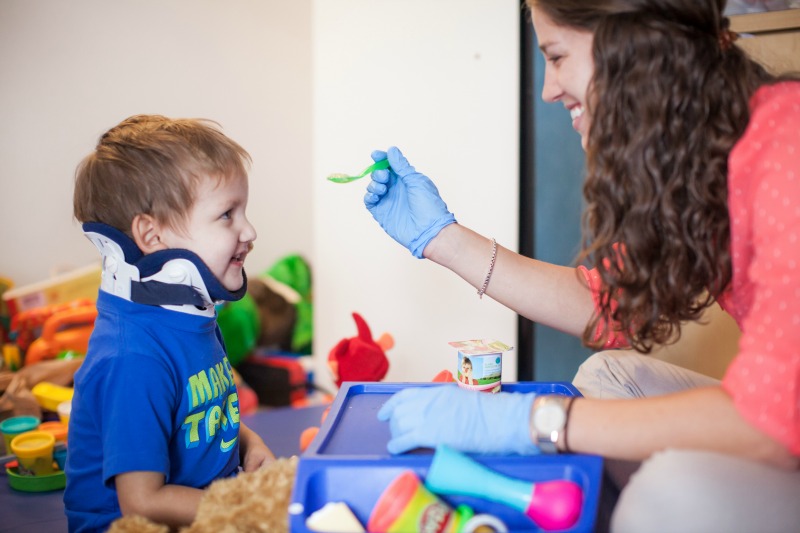Guiding Your Child Towards Success with Feeding Therapy Long Island
Wiki Article
Navigating the Path to Effective Feeding: Ingenious Techniques and Treatments for Effective Feeding Treatment
Are you having a hard time to find efficient methods and treatments for successful feeding therapy? Look no further. This short article will certainly direct you with the course to success, giving innovative methods to evaluate feeding difficulties and established achievable goals. With evidence-based strategies, you'll discover just how to deal with sensory processing problems and make use of assistive innovation and flexible equipment. Plus, we'll show you the relevance of working together with family members and caregivers for optimum feeding results. Obtain all set to navigate the path to effective feeding!Assessing Feeding Obstacles and Identifying Objectives
You must start by examining your kid's feeding challenges and determining specific objectives for their therapy. It's important to connect these objectives with your kid's feeding therapist so they can customize the therapy sessions to address these certain obstacles. By assessing your youngster's feeding challenges and setting goals, you are taking the initial step in the direction of assisting them develop successful feeding abilities.Executing Evidence-Based Techniques for Feeding Treatment
Applying evidence-based strategies for feeding therapy can bring about positive outcomes for kids. You are guaranteeing that the treatments used are supported by clinical research and have been confirmed efficient when you include these techniques into your child's therapy strategy. This technique boosts the probability of success and assists deal with the details feeding challenges your youngster might be experiencing.By adhering to evidence-based strategies, you can supply your youngster with the very best possible care and assistance. These techniques may include using a range of sensory experiences throughout mealtimes, such as exploring various appearances and tastes, to motivate acceptance of new foods. In addition, implementing therapy strategies can assist attend to fussy consuming practices and promote healthier eating patterns.
One more important aspect of evidence-based feeding treatment is including the family in the treatment process. By offering education and learning and assistance to parents and caretakers, they can play an active duty in aiding their child get over feeding obstacles. This joint technique improves the efficiency of therapy and promotes long-term favorable modifications in your child's consuming practices.

Attending To Sensory Processing Issues in Feeding Treatment
Attending to sensory handling issues in feeding therapy can be challenging, however it is essential for promoting a favorable consuming experience for children. When you experience a child with sensory processing problems during mealtime, it is necessary to comprehend that their reactions to particular textures, preferences, smells, or even noises are not deliberate (feeding therapy long island). By acknowledging and resolving these issues, you can help create a helpful setting that urges healthy consuming practices
This method allows the kid to become familiar with the food and its sensory homes at their own pace. In addition, providing a range of textures and flavors can aid desensitize their sensory system and broaden their food preferences.
Involving the kid in sensory play tasks can additionally be helpful. Motivate them to explore various structures, such as squishing, squeezing, or touching various food items. This can help stabilize sensory input and lower hostilities to specific structures.
Another essential element is providing a tranquil and organized eating atmosphere. Decrease diversions, such as intense lights or loud noises, which can bewilder their detects and impede their ability to focus on eating. Creating a foreseeable regular and utilizing visual schedules can additionally assist the youngster really feel even more safe and in control throughout nourishment.

Using Assistive Innovation and Adaptive Devices
Using assistive innovation and adaptive tools can substantially boost the feeding experience for youngsters with sensory handling problems. Nourishment can be frustrating and difficult when you have problem with sensory handling. But with the right devices, you can make it a more successful and pleasurable experience.One choice is making use of specialized plates and utensils designed to suit your Continued requirements. These tools might have textured takes care of or a larger hold, making them less complicated to manipulate and hold. Plates with split areas can help separate various foods and avoid them from touching, which can be a resource of pain for some children.
Along with specialized plates and tools, there are likewise assistive tools that can be made use of throughout feeding. As an example, a heavy vest or lap pad can supply deep pressure input, aiding to relax and control your sensory system. A shaking tooth brush or chewable fashion jewelry can provide dental sensory stimulation, making the act of eating much more satisfying.
Technology can also play a duty in enhancing the feeding experience. There are apps and tools offered that can offer visual or auditory hints, such as timers or motivates, to help you stay focused and arranged throughout mealtime.
Teaming Up With Households and Caregivers for Successful Feeding End Results
When working together with caretakers and family members, you can interact to produce a nurturing and supportive atmosphere for effective feeding end results. By including households and caretakers in the feeding therapy process, you can gain valuable insights into the youngster's feeding challenges, habits, and choices. food therapist farmingdale. This partnership enables an alternative method to feeding therapy, attending to not only the physical elements however likewise the mental and psychological factors that may influence a kid's feeding capacitiesOne trick aspect of working together with caregivers and households is providing education and training. By equipping them with understanding and skills, they about his can proactively join the feeding treatment procedure and support the child's development outside of therapy sessions. This can consist of educating them feeding methods, methods for managing nourishment actions, and understanding the significance of consistency and routine in establishing healthy consuming practices.
Furthermore, including families and caretakers in setting goal and treatment planning ensures that their viewpoints and goals for the child are thought about. By collaborating, you can establish reasonable and achievable objectives that align with the family members's values and top priorities - feeding therapy farmingdale ny. This joint strategy fosters a sense of possession and empowerment, developing a solid foundation for successful feeding end results
In addition, routine and open interaction with families and caregivers is important for efficient cooperation. By keeping ongoing dialogue, you can resolve issues, give support, and make necessary modifications to the feeding treatment plan as required. This communication also enables sharing development updates, celebrating success, and identifying any challenges or barriers that might emerge.

Verdict
Congratulations on finishing this article on navigating the path to effective feeding! You have discovered different approaches and interventions for effective feeding therapy, such as examining obstacles, applying evidence-based approaches, addressing sensory handling problems, and using assistive innovation. By collaborating with caregivers and family members, you can ensure successful feeding outcomes. Remember to always stay proactive and check my site ingenious in your technique to feeding therapy. Maintain the magnum opus!It's vital to connect these objectives with your child's feeding specialist so they can tailor the treatment sessions to deal with these specific challenges.Carrying out evidence-based methods for feeding treatment can lead to positive outcomes for kids.Dealing with sensory processing issues in feeding treatment can be difficult, yet it is essential for promoting a favorable consuming experience for kids. By including family members and caregivers in the feeding treatment procedure, you can get important insights right into the kid's feeding difficulties, preferences, and practices. By equipping them with expertise and skills, they can proactively take part in the feeding treatment procedure and support the kid's progress outside of therapy sessions.
Report this wiki page